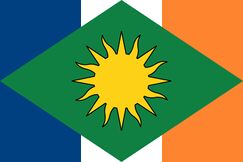President of the Republic of Vegno: Difference between revisions
No edit summary |
(→Powers) |
||
| Line 11: | Line 11: | ||
== Powers == | == Powers == | ||
Although the prime minister of Vegno, through their Government as well as Parliament, oversee much of the nation's actual day-to-day domestic affairs, the | Although the prime minister of Vegno, through their Government as well as Parliament, oversee much of the nation's actual day-to-day domestic affairs, the Vegnese president wields significant influence and authority, especially in the fields of national security and foreign policy. The president's greatest power is the ability to choose the prime minister. However, since it is the [[Assemblea Nazionale]] that has the sole power to dismiss the prime minister's government, the president is forced to name a prime minister who can command the support of a majority in the assembly. The legislative elections are held the same days of the presidential. | ||
[[File:Vegnese Presidential flag.jpg|left|thumb|243x243px|Standard of the President of the Republic]] | [[File:Vegnese Presidential flag.jpg|left|thumb|243x243px|Standard of the President of the Republic]] | ||
The constitution gives the president the following powers: | The constitution gives the president the following powers: | ||
Revision as of 19:18, 8 March 2022
| President of Vegno
| |
 Presidential | |
| Style | President of the Republic of Vegno (informal) |
|---|---|
| Residence | Cossa |
| Appointer | Vegnese Citizens |
| Term length | Three years |
| Constituting instrument | Constitution of Vegno |
| Inaugural holder | Antonio Visciglia (1706 AN) |
The President of Vegno, officially denoted as President of the Republic of Vegno is the head of the state of Vegno. In that role, the president represents national unity, and guarantees that Vegno politics comply with the Constitution of Vegno. The president is the commander in chief of the armed forces and chairs the high council of Judiciary.
A president's term of office lasts for three years. The incumbent president is Pedro Antonio Charles Visciglia, who was elected in 1706 Vegno Elections.
Election and mandate
The officeholder is directly elected by universal suffrage: every Vegnese citizen over the age of twenty-two can vote for a single candidate for the Presidency.
The President of the Republic of Vegno assumes office after taking an oath and delivering a presidential address.
The term of the President of the Vegnese Republic lasts three years (three months for the Gregorian calendar).
Powers
Although the prime minister of Vegno, through their Government as well as Parliament, oversee much of the nation's actual day-to-day domestic affairs, the Vegnese president wields significant influence and authority, especially in the fields of national security and foreign policy. The president's greatest power is the ability to choose the prime minister. However, since it is the Assemblea Nazionale that has the sole power to dismiss the prime minister's government, the president is forced to name a prime minister who can command the support of a majority in the assembly. The legislative elections are held the same days of the presidential.
The constitution gives the president the following powers:
- The President of the Republic guarantees compliance with the Constitution. Through its arbitration, it ensures the regular functioning of public authorities and the continuity of the state. It is the guarantor of national independence, the integrity of the territory and compliance with the treaties.
- The President of the Republic appoints the Prime Minister. He terminates his duties upon presentation by the latter of the resignation of the Government. At the proposal of the Prime Minister, it appoints the other members of the government and puts an end to their functions. The President of the Republic chairs the Council of Ministers.
- The President promulgates the laws, can submit referendums, can dissolve the National Assembly, sign the ordinances and decrees approved by the Council of Ministers and assign civil and military offices to the State.
- The President accredits the ambassadors.
- The President is the head of the Armed Forces.
- The President, if the Nation is seriously threatened, can assume exceptional powers.
- The President has a series of his own prerogatives which do not require countersignature and other shared prerogatives which require the countersignature of the Prime Minister (or the minister responsible).
- The President of the Republic negotiates and ratifies (international) treaties.
- The President of the Republic is the guarantor of the independence of the judicial authority.
- The President of the Republic can be dismissed only in case of failure to fulfill his duties incompatible with the exercise of his mandate. The dismissal is pronounced by the Parliament meeting in the High Court.
List of Presidents
| N. | Portrait | Name | Term of office | Party | Election | ||
|---|---|---|---|---|---|---|---|
| Took office | Left office | ||||||
| 1 | 
|
Pedro Antonio Charles Visciglia | 1706 NA | - | Partito Democratico Costituzionale | 1706 | |

